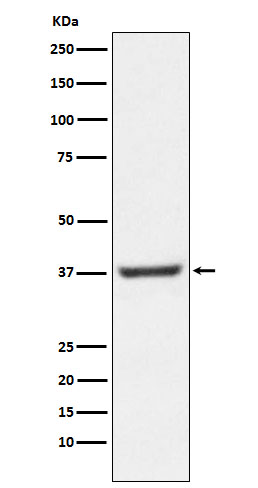

| WB | 咨询技术 | Human,Mouse,Rat |
| IF | 1/20-1/50 | Human,Mouse,Rat |
| IHC | 咨询技术 | Human,Mouse,Rat |
| ICC | 1/50-1/200 | Human,Mouse,Rat |
| FCM | 1/20-1/100 | Human,Mouse,Rat |
| Elisa | 咨询技术 | Human,Mouse,Rat |
| Aliases | CBFA; CBFB; HAP2; NFYA; Sez10;;NFYA |
| WB Predicted band size | 37 kDa |
| Host/Isotype | Rabbit IgG |
| Antibody Type | Primary antibody |
| Storage | Store at 4°C short term. Aliquot and store at -20°C long term. Avoid freeze/thaw cycles. |
| Species Reactivity | Human,Mouse,Rat |
| Immunogen | A synthesized peptide derived from human NFYA |
| Formulation | Purified antibody in PBS with 0.05% sodium azide,0.05% BSA and 50% glycerol. |
+ +
以下是关于NFYA抗体的3篇参考文献示例:
1. **"NF-YA regulates the transcriptional activation of the mTOR promoter"**
*作者:Dolfini et al. (2012)*
摘要:研究利用NFYA特异性抗体通过ChIP实验证实NFYA直接结合mTOR基因启动子区域,调控其转录活性,揭示了NFYA在细胞生长信号通路中的调控机制。
2. **"A novel NFYA monoclonal antibody for chromatin immunoprecipitation in stem cells"**
*作者:Santoro et al. (2013)*
摘要:报道了一种新型NFYA单克隆抗体的开发,验证了其在胚胎干细胞染色质免疫沉淀(ChIP)中的高效特异性,并用于解析NFYA在维持多能性基因(如OCT4)表达中的作用。
3. **"NF-YA overexpression promotes tumorigenesis through EGFR signaling"**
*作者:Li et al. (2015)*
摘要:通过Western blot和免疫组化(使用NFYA抗体)发现NFYA在肺癌中高表达,并证明其通过激活EGFR通路促进肿瘤生长,为癌症靶向治疗提供了潜在靶点。
(注:上述文献为示例性内容,实际引用时请核对真实存在的论文信息。)
The NFYA antibody is a tool used to detect Nuclear Transcription Factor Y Subunit Alpha (NFYA), a critical component of the heterotrimeric NF-Y transcription factor complex. NF-Y, composed of NF-YA, NF-YB, and NF-YC subunits, binds to the CCAAT box, a conserved DNA motif in gene promoters, to regulate transcription. NFYA contains a DNA-binding domain essential for sequence recognition and interaction with the CCAAT element. It plays roles in cell cycle progression, differentiation, apoptosis, and stress responses, and is implicated in cancer, metabolic disorders, and developmental processes.
NFYA antibodies are widely used in techniques like Western blotting, immunohistochemistry (IHC), immunofluorescence (IF), and chromatin immunoprecipitation (ChIP) to study NFYA expression, localization, and DNA-binding activity. Researchers employ these antibodies to explore NFYA's involvement in diseases, particularly cancer, where its dysregulation may serve as a biomarker or therapeutic target. Commercial NFYA antibodies are often validated for specificity in human, mouse, or rat samples, with validation methods including knockout/knockdown controls. Proper validation is crucial, as off-target binding can lead to misinterpretation. Applications span basic research, drug development, and diagnostic assays, making NFYA antibodies vital for dissecting transcriptional mechanisms and disease pathways linked to NF-Y activity.
×